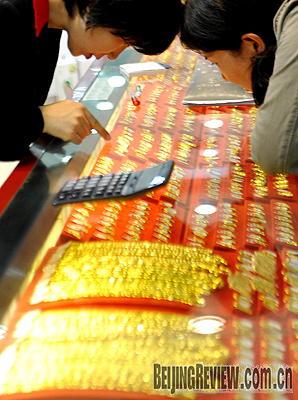| Numbers of the Week
76.56 percent
Gold producers nationwide have had revenue of 100.46 billion yuan ($14.64 billion) this year, a 76.56-percent year-on-year increase, due to soaring global gold prices, according to the Ministry of Industry and Information Technology.
12,985 units
Japan's Mitsubishi Motors Corp. will recall 12,985 vehicles exported to China starting on December 18 because of problems with brake lights, the General Administration of Quality Supervision, Inspection and Quarantine announced on December 9.

TO THE POINT: China's CPI and PPI growth rates dropped rapidly in November, an alarming sign of the deepening downside risks of the Chinese economy. The crisis also affected the country's exports, which fell for the first time since June 2001. Meanwhile, the economic slowdown has put brakes on foreign fund inflows with FDI declining continuously. Property markets have lost further steam before the government's stabilization policies take effect. German company Siemens defies the economic slowdown to enjoy spectacular growth in China.
By HU YUE
Major Economic Figures for November
CPI-up 2.4 percent
China's inflationary jitters are fading fast as the consumer price index (CPI), a barometer of inflation, continues its downward trend.
The National Bureau of Statistics (NBS) said the CPI's year-on-year growth in November was 2.4 percent, or 1.6 percentage points lower than in October. The index had even peaked at 8.7 percent this February before falling in the following months.
Pork prices, a major trigger of the yearlong inflation, plunged 9.3 percent over the same period last year.
Analysts said this would make it achievable for the country to accomplish the prescribed target of reining in CPI growth for the whole year at less than 4.8 percent.
A report of Merrill Lynch & Co. said that the CPI could fall into negative territory in the coming months, giving the government more room to implement an "accommodative monetary policy" and step up its fiscal stimulus measures.
PPI-up 2 percent
The producer price index (PPI), a measure of inflation at the wholesale level, came in with a year-on-year rise of only 2 percent in November, down from a 6.6-percent growth rate in October, stoking deep worries over a precipitous economic slowdown and growing deflationary risks. It was the slowest pace for the PPI since May 2006, the NBS said.
The Merrill Lynch report interpreted the plummeting PPI as an indication that the economy was cooling down rapidly. The report also attributed the sharper-than-expected PPI drop to plunging prices in the mining sector and raw materials.
Meanwhile, analysts have been fretting that the economy under the pincer grip of anemic domestic demand could fall into the trap of deflation. Bai Chong'en, an economics professor at Tsinghua University, warned of deepening deflationary risks for next year.
"But a larger picture for the future PPI trend is yet to be on full display as uncertainties remain," he said in a printed statement. "The prices of raw materials may well bounce back as the 4-trillion-yuan ($586-billion) stimulus package materializes."
Exports--down 2.2 percent
China's exports fell in November for the first time in more than seven years.
According to data from the General Administration of Customs, the country's exports shrank 2.2 percent in November year on year, a sharp correction from their 19.2-percent growth rate in October. More surprisingly, imports, in striking contrast to the 15.6-percent growth they experienced last month, nose-dived by 17.9 percent, which helped widen the trade gap. November's trade surplus hit an unprecedented $40.1 billion, the fourth month in a row that saw a record high.
Analysts said the contraction in imports occurred largely because of withering domestic demand for commodities, which account for roughly 30 percent of the country's total imports.
"The grim trade situation is sending worrying signals that the global financial storm has been severely weighing down the Chinese economy," said Zhang Yansheng, a senior economist at the National Development and Reform Commission, in a Xinhua News Agency article.
| 